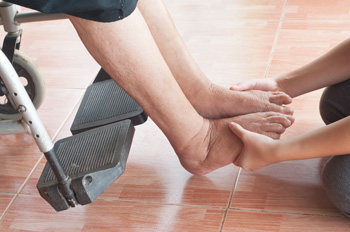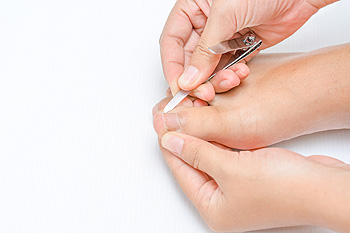Douglas Pacaccio, DPM
Thomas Nordquist, DPM
December 2022
Various Reasons for Foot Pain

Our feet provide us with the mobility to walk, run, and complete daily tasks. It is important to take proper steps in taking care of our feet, and this may help in preventing foot pain. Despite this information, research has indicated that approximately one out of three people who are over 65 years old will have foot pain. Heel pain is common, and may be a sign of plantar fasciitis. This can happen when the plantar fascia becomes inflamed from wearing shoes that do not fit correctly. Athlete’s foot can be uncomfortable and unsightly. This can develop from a fungal infection, and it may be prevented by wearing appropriate shoes while frequenting public swimming pools and locker rooms. A pain or ache in the back of the leg may indicate an Achilles tendon injury has developed, and it may come from increasing speed or distance too quickly while running. Any type of foot pain can wreak havoc on the day’s activities, and it is advised that you speak to a podiatrist who can determine what the cause is and treat your foot pain accordingly.
Foot Pain
Foot pain can be extremely painful and debilitating. If you have a foot pain, consult with one of our podiatrists from Advanced Foot and Ankle Surgeons, Inc. . Our doctors will assess your condition and provide you with quality foot and ankle treatment.
Causes
Foot pain is a very broad condition that could be caused by one or more ailments. The most common include:
- Bunions
- Hammertoes
- Plantar Fasciitis
- Bone Spurs
- Corns
- Tarsal Tunnel Syndrome
- Ingrown Toenails
- Arthritis (such as Gout, Rheumatoid, and Osteoarthritis)
- Flat Feet
- Injury (from stress fractures, broken toe, foot, ankle, Achilles tendon ruptures, and sprains)
- And more
Diagnosis
To figure out the cause of foot pain, podiatrists utilize several different methods. This can range from simple visual inspections and sensation tests to X-rays and MRI scans. Prior medical history, family medical history, and any recent physical traumatic events will all be taken into consideration for a proper diagnosis.
Treatment
Treatment depends upon the cause of the foot pain. Whether it is resting, staying off the foot, or having surgery; podiatrists have a number of treatment options available for foot pain.
If you have any questions, please feel free to contact one of our offices located in Sycamore, and Yorkville, IL . We offer the newest diagnostic and treatment technologies for all your foot care needs.
Do Feet Ever Stop Growing?

Feet play an undervalued but critical role in our lives. Feet support the body and help with stability and balance. They also make it possible to walk, run, climb, and stand. Children’s feet grow rapidly. Usually, feet stop growing around age 20 or 21, but it is dependent on when puberty begins. The earlier one starts puberty, the earlier the feet should stop growing. Genetics is a factor as well. While adults might feel their feet are continuing to grow in later life, it is usually related to age-related changes, such as weight gain, loose ligaments, or deformities like bunions or hammertoes as opposed to actual bone growth. If you are a senior, experts recommend buying shoes a half-size larger to accommodate normal foot changes. Should you have pain or other problems with your feet or ankles as you age, consult with a podiatrist who has the knowledge and skills to help you.
If you need your feet checked, contact one of our podiatrists of Advanced Foot and Ankle Surgeons, Inc. . Our doctors will attend to all of your foot and ankle needs and provide you with quality treatment.
Geriatrics and Podiatry
When people age, some common issues that may occur are bone density loss, dry skin, poor circulation, and rough brittle nails. These issues may also affect your foot health if the necessary steps are not taken to alleviate the problems.
It is important to take care of your feet because feet that are injured or diseased can affect your overall health. Having painful feet hinders your ability to do daily activities or may decrease your willingness to do the things that you need to do.
Visiting Your Geriatrician
As we age, health problems become more likely, so it is essential to visit your doctor for check-ups to ensure that you are doing the best you can to take care of your health. It is recommended to check your feet frequently for any possible cuts, bruises, swelling, corns or any other irregularities.
Taking Care of Elderly Feet
Cracked or dry feet can be treated by applying moisturizer often. It is also important not to wear old socks because the older the sock is, the higher the possibility there will be that there is bacteria there. Wear fresh socks and make sure they fit properly.
Proper foot health means that you can have a more active lifestyle and you will not be bogged down by pain. Foot health also leads to good circulation, which is paramount for overall health.
If you have any questions, please feel free to contact one of our offices located in Sycamore, and Yorkville, IL . We offer the newest diagnostic tools and technology to treat your foot and ankle needs.
How to Exercise for Weight Loss With Foot Pain
 Different people will respond to different exercise regimens when they want to lose weight and are challenged with foot problems. Beyond figuring out which exercises will work best, it may be hard to stay motivated. Pilates is one such program that can provide a total body workout of strength and flexibility while not taxing the feet. Swimming can also be a good alternative to the weight-bearing of traditional walking or running to lose weight. Weight training, and a program that incorporates at least one exercise for each direction that the joints of the body move should be sought. If you are having trouble losing weight because you suffer from foot pain, it is suggested that you seek evaluation and treatment from a podiatrist. The quicker the core issue is tended to, the faster and easier it will be to get back to exercising and lose unwanted weight.
Different people will respond to different exercise regimens when they want to lose weight and are challenged with foot problems. Beyond figuring out which exercises will work best, it may be hard to stay motivated. Pilates is one such program that can provide a total body workout of strength and flexibility while not taxing the feet. Swimming can also be a good alternative to the weight-bearing of traditional walking or running to lose weight. Weight training, and a program that incorporates at least one exercise for each direction that the joints of the body move should be sought. If you are having trouble losing weight because you suffer from foot pain, it is suggested that you seek evaluation and treatment from a podiatrist. The quicker the core issue is tended to, the faster and easier it will be to get back to exercising and lose unwanted weight.
Obesity has become very problematic at this point in time and can have extremely negative effects on the feet. If you’re an obese individual and are concerned about your feet, contact one of our podiatrists from Advanced Foot and Ankle Surgeons, Inc. . Our doctors can provide the care you need to keep you pain-free and on your feet.
Obesity and Your Feet
Since your feet are what support your entire weight when standing, any additional weight can result in pain and swelling. Being overweight is one of the main contributors to foot complications.
Problems & Complications
Extra Weight – Even putting on just a few extra pounds could create serious complications for your feet. As your weight increases, your balance and body will shift, creating new stresses on your feet. This uneven weight distribution can cause pain, even while doing the simplest tasks, such as walking.
Diabetes – People who are overweight are at serious risk of developing type-2 diabetes, which has a drastic impact on the health of your feet. As you get older, your diabetes might worsen, which could lead to loss of feeling in your feet, sores, and bruises. You could also become more prone to various infections.
Plantar fasciitis – Pressure and stress that is placed on muscles, joints, and tendons can trigger plantar fasciitis, which is an inflammation of tissue that forms along the bottom of the foot.
If you have any questions please feel free to contact one of our offices located in Sycamore, and Yorkville, IL . We offer the newest diagnostic and treatment technologies for all your foot and ankle needs.
Reasons for Ingrown Toenails

An ingrown toenail is often difficult to ignore. It is easy to notice, as the nail grows into the skin instead of over it. The symptoms include severe pain where the nail meets the skin, and it is often red and swollen. Shoes may be painful to wear, and relief is often sought. A temporary remedy consists of soaking the affected foot in warm water, and this can help to soften the skin. At this point, a small piece of cotton can be used to gently pull the skin away from the nail. The pain can return once the skin has hardened, and it is advised to seek professional medical attention which can help to provide a permanent solution. A common reason why ingrown toenails develop can be from the shoes that are worn, which may be too tight. Additionally, it may happen from trimming the toenails incorrectly, possibly causing the nail to cut into the skin. If you have developed this painful foot condition, it is strongly suggested that you confer with a podiatrist who can provide effective treatment methods and relieve painful symptoms.
Ingrown toenails may initially present themselves as a minor discomfort, but they may progress into an infection in the skin without proper treatment. For more information about ingrown toenails, contact one of our podiatrists of Advanced Foot and Ankle Surgeons, Inc. . Our doctors can provide the care you need to keep you pain-free and on your feet.
Ingrown Toenails
Ingrown toenails are caused when the corner or side of a toenail grows into the soft flesh surrounding it. They often result in redness, swelling, pain, and in some cases, infection. This condition typically affects the big toe and may recur if it is not treated properly.
Causes
- Improper toenail trimming
- Genetics
- Improper shoe fitting
- Injury from pedicures or nail picking
- Abnormal gait
- Poor hygiene
You are more likely to develop an ingrown toenail if you are obese, have diabetes, arthritis, or have any fungal infection in your nails. Additionally, people who have foot or toe deformities are at a higher risk of developing an ingrown toenail.
Symptoms
Some symptoms of ingrown toenails are redness, swelling, and pain. In rare cases, there may be a yellowish drainage coming from the nail.
Treatment
Ignoring an ingrown toenail can have serious complications. Infections of the nail border can progress to a deeper soft-tissue infection, which can then turn into a bone infection. You should always speak with your podiatrist if you suspect you have an ingrown toenail, especially if you have diabetes or poor circulation.
If you have any questions, please feel free to contact one of our offices located in Sycamore, and Yorkville, IL . We offer the newest diagnostic and treatment technologies for all your foot care needs.
Wounds That Don't Heal Need to Be Checked
Blog Archives
- July 2024
- June 2024
- May 2024
- April 2024
- March 2024
- February 2024
- January 2024
- December 2023
- November 2023
- October 2023
- September 2023
- August 2023
- July 2023
- June 2023
- May 2023
- April 2023
- March 2023
- February 2023
- January 2023
- December 2022
- November 2022
- October 2022
- September 2022
- August 2022
- July 2022
- June 2022
- May 2022
- April 2022
- March 2022
- February 2022
- January 2022
- December 2021
- November 2021
- October 2021
- September 2021
- August 2021
- July 2021
- June 2021
- May 2021
- April 2021
- March 2021
- February 2021
- January 2021
- December 2020
- November 2020
- October 2020
- September 2020
- August 2020
- July 2020
- June 2020
- May 2020
- April 2020
- March 2020
- February 2020
- January 2020
- December 2019
- November 2019
- October 2019
- September 2019
- August 2019
- July 2019
- June 2019
- May 2019
- April 2019
- March 2019
- February 2019
- January 2019
- December 2018
- November 2018
- October 2018
- September 2018









